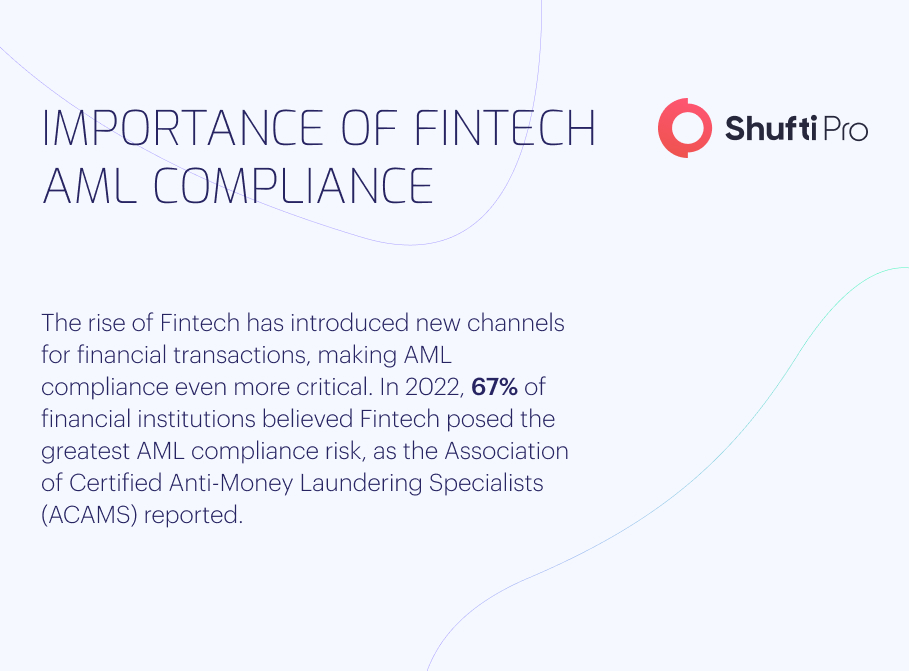Anti-Money Laundering Challenges Faced by the Fintech Industry

Since the implementation of the bank Secrecy Act (BSA) in 1970, the United States government has continuously enhanced Anti Money Laundering (AML) laws, most recently in 2022 and 2023. The increased sophistication of financial criminals necessitated these modifications, as they increasingly employ sophisticated technological methods to conceal illicit activities. Despite the success of the AML system, there are still too many who can hide ill-gotten gains in respectable businesses successfully.
Many threats, including financial crimes, threaten the Fintech business in today’s age of hyperconnectivity and digitalisation. Unfortunately, due to Fintech’s streamlined processes and worldwide reach, criminals have more opportunities to compromise the financial system. To protect operations and keep the trust of clients and stakeholders, Fintech companies must address issues including fraud, cybercrime, terrorist funding, money laundering, and regulatory non-compliance.
Importance of Fintech AML Compliance
Innovations in computing power, user interface design, and network connectivity worldwide have brought financial technology to a new zenith. However, one should always be on guard against being a target of criminal activity. Since Fintech is primarily technological, there is significant pressure on it to prevent fraud even as it experiences extraordinary growth. To help startups struggling to deal with Fintech money laundering, regtech companies offer tailored Fintech anti money laundering solutions.
Certain aspects of risk management in the Fintech industry are obligatory to reduce the possibility of financial crime. The following components are necessary for them to remain AML-compliant, as outlined by the Federal Financial Institutions Examinations Council (FFIEC).
Proven AML Compliance Programmes
The following components make up what is called an “AML compliance programme” under current U.S. regulations:
- Compliance Officer — A person who ensures an ongoing anti money laundering compliance programme.
- Ongoing Training — Financial institutions must provide ongoing training on Anti Money Laundering rules, including any changes made by law since employees were hired.
- Transaction Monitoring — Financial institutions must monitor all transactions of $10,000 or more. Still, they should also be on the lookout for suspect transactional trends, such as those involving potentially problematic offshore accounts.
- Examining Sanctions — Banks and other financial institutions must also conduct customer due diligence to avoid doing business with those on sanctions lists.
To combat money laundering and terrorism financing, the European Union has implemented similar AML compliance programme criteria.

AML Challenges for Fintech Industry
Companies providing Fintech services need to know how to comply with AML rules and how to avoid common traps in Fintech compliance programmes to stay on the right side of the law and prevent criminals from abusing offerings. Fintech firms’ difficulties in meeting AML requirements are described below:
- At the outset of operations, Fintech companies must have fully functional AML systems in place. When providing financial services, a Fintech company must have a practical and fully functional Anti Money Laundering (AML) mechanism in place. Many Fintech businesses offer financial services before the compliance programme is fully up and running. As a result, financial dealings may not be watched closely, and businesses may unknowingly run counter to regulations, leaving them open to prosecution or enforcement action.
- Fintech companies that are increasing must ensure compliance programmes can keep up. Even if a Fintech firm has an AML compliance procedure in place, it may need help to evolve with the company as it grows. For instance, a business must implement KYC due diligence if it wants a successful AML programme. While initial client due diligence on the part of a Fintech startup may be sufficient, the company’s ability to handle the influx of new customers from various demographic and geographic backgrounds is too much for the KYC procedure. As the number of transactions processed by an app rapidly increases over the course of a year, similar difficulties may occur in generating SARs and completing other reporting requirements.
- When illegal funds are processed through Fintech platforms to make them look legitimate, the media might become money laundering targets. There is a risk that criminals may use the anonymity and ease of cross-border Fintech transactions to launder stolen money.
- Fintech services are vulnerable to fraud and identity theft because of their digital nature. Fraudulent transactions and unauthorised use of financial resources are possible when bad actors take advantage of security holes, forge user credentials, or conduct account takeovers.
- Cybercriminals are increasingly targeting the financial technology industry because of the large amounts of sensitive client data these businesses keep and analyse. Data breaches can result in significant financial losses and reputational impact because they put users at risk of fraud, identity theft, and compromising sensitive personal and financial information.
- Fintech companies may incur legal and regulatory penalties if they fail to comply with AML and Know Your Customer (KYC) rules. Severe repercussions, such as monetary penalties and loss of licences, can arise from a lack of transaction monitoring, insufficient customer due diligence, and failure to report suspicious actions.
- Employees or other insiders at Fintech companies may pose a threat if they use insider knowledge of the company’s systems, processes, and vulnerabilities for fraud. This can be anything from tampering with customer information or financial transactions to conspiring with outside parties for nefarious ends.
The Impact of AML Regulations on Fintech Companies
Like any other financial institution, Fintechs must monitor customers, examine financial dealings, watch for anything unusual, and report suspicious conduct to the proper authorities. Fintech firms need to be aware of the following to comply with AML rules:
Customer Conversion Rates
More robust Anti Money Laundering measures may initially result in poorer consumer conversion rates for Fintech companies. Increased security for logins and financial transactions can slow things down. However, these problems can be mitigated, if not entirely avoided, using cutting-edge AML tools and smart orchestration.
Reduced Processing Times
The additional steps required for verification brought on by AML safeguards might add time to the processing of financial transactions. Criminals have long taken advantage of the rapidity of Internet banking transactions to avoid detection by authorities conducting routine aml checks. Customers may be annoyed, but slowing things down could be important in the fight against financial fraudsters.
False-Positive AML Alerts
False-positive AML alerts are an inevitable byproduct of money-laundering screening. An incorrectly spelt name is a common cause of this problem. As a result, it’s possible that positive matches will need to undergo human screening to weed out false positives. Again, cutting-edge-AML software may make this much easier for Fintech firms.
The Complexity of International Transactions
Cross-border transactions are essential to the success of businesses worldwide, but they also present a unique opportunity for money launderers due to the complexity and inconvenience of AML screening them.
For transactions totalling $250 or more, the United States has proposed amendments in 2020 that would mandate the gathering and transferring of additional data. The requirement to keep an eye on these dealings stands in the way of rapid completion.
Technology And Methods That Bypass AML
Financial crooks adapt methods alongside the evolving and improving AML regulations. Some have adopted cyber currency as a less detectable means of money laundering. Some people have gotten good at relocating funds through a series of modest, sporadic deals. Some use technology to cover up illegal actions, while others actively seek it out. The AML system is too rigid right now to catch and punish all the sophisticated criminals out there.

How can Shufti Help
Shufti is an indispensable partner for the Fintech industry, offering cutting-edge AML solutions that fortify compliance efforts and safeguard against financial crime. With an extensive database of over 1,700 watchlists, Shufti ensures that Fintech companies can rigorously screen customers and entities against PEPs, sanctions, adverse media, and more, guaranteeing strict adherence to AML regulations. Moreover, Shufti’s four-tier PEP screening system, coupled with the flexibility to incorporate custom data sources, empowers businesses to tailor the risk assessment process precisely to unique needs. This comprehensive approach extends beyond just customers, enabling the screening of close relatives and associates, thereby providing an all-encompassing view of potential risks. Shufti is an essential ally in the Fintech industry’s ongoing battle against money laundering by effectively reducing false positives and enhancing accuracy in risk evaluation. Shufti is an effective and cutting-edge option for Fintech firms concerned with AML compliance and financial crime prevention.
Contact us if you’re ready to strengthen AML compliance and protect financial transactions to the fullest extent possible.











